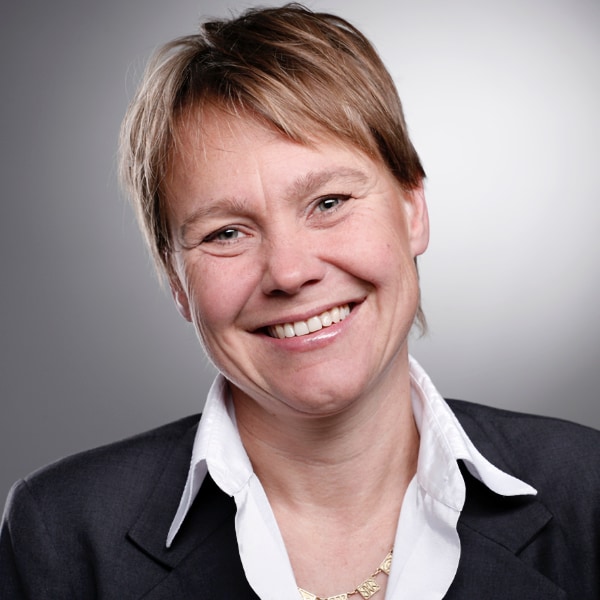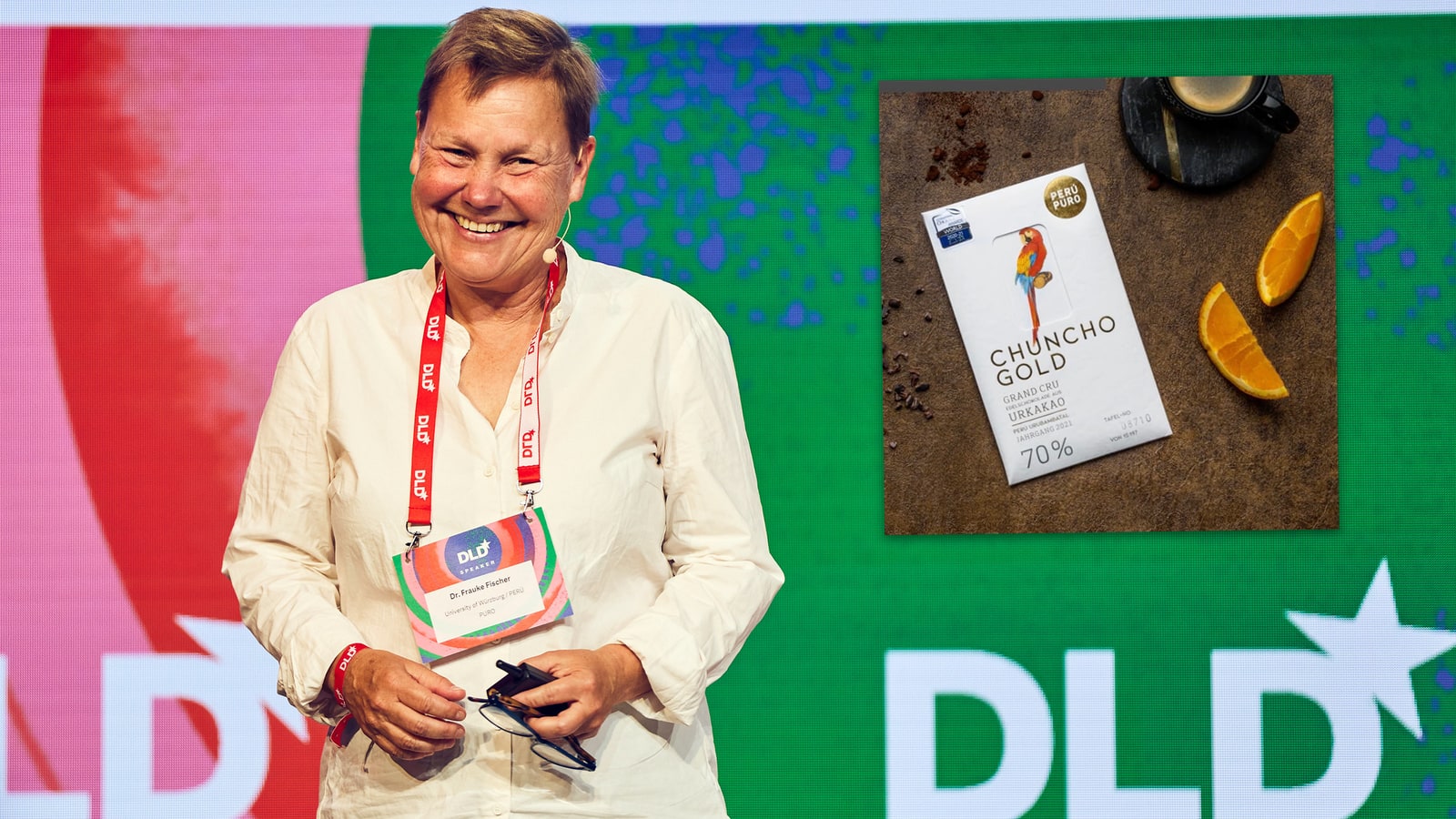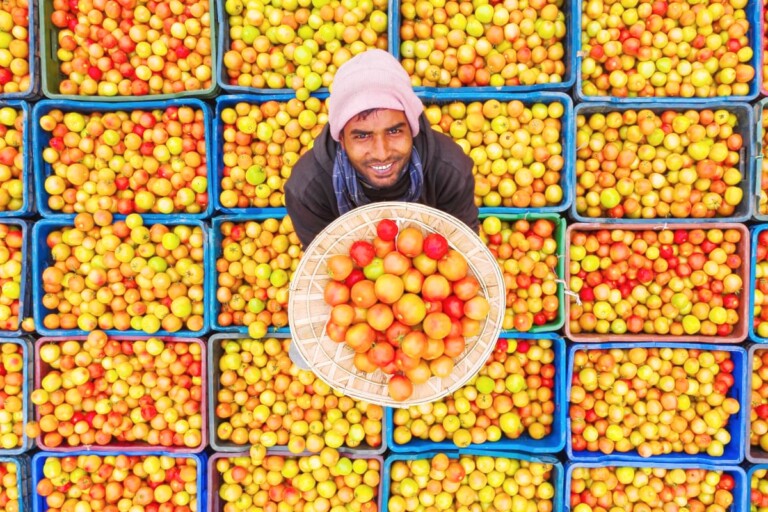
Eat Chocolate to Protect the Rainforest? Sweet!
With her company Perú Puro, tropical biologist Frauke Fischer supports farmers in the Andes – and delights the taste buds of her customers.
This may sound too good to be true. Can you really treat yourself to award-winning chocolate and give nature a boost, too? Yes, you can – if you support Perú Puro, the project of Dr. Frauke Fischer, a tropical biologist from Bavaria who became an entrepreneur to make a positive impact in her field of research, beyond academics.
In our interview, Frauke Fischer explains how Perú Puro helps farmers in the Andes restore biodiversity and degraded rainforests, why the positive effects extend to local communities, and what’s in store for you if you prefer sustainably farmed coffee or brazil nuts. Watch her DLD Circular 2023 presentation here to learn more.

Dr. Frauke Fischer heads the Department of Animal Ecology and Tropical Biology at the university of Würzburg. In 2015, she co-founded Perú Puro to provide smallholder farmers in Peru with fair market access for their high-quality, organic Chuncho cacao.
Speaker ProfileHow can eating chocolate – your chocolate – help to save the rainforest?
The emphasis is important: It has to be our chocolate because we are definitely the only biodiversity- and rainforest-positive chocolate on the market. We work together with a group of smallholders in the Peruvian Amazon region at the eastern slopes of the Andes. Our farmers produce cacao in biodiversity-rich agroforestry systems. They own a fairly large patch of tropical, pristine rainforest and they agree to protect that rainforest as long as we buy the cacao.
You’re an ecologist. Why did you get into the business of producing chocolate?
I’ve worked in the tropics for more than 30 years now, and I felt uneasy with only collecting scientific data and publishing scientific reports, while I was seeing all these challenges in these areas. For me, it was a logical step to not only collect data and publish scientific articles, but also to do something on the ground. Everything we do in Peru is science-based, and I think that’s very, very important.
The agroforestry systems our farmers help to protect are very special because they keep up the soil health, the fertility of the soil. And this makes them permanent agricultural sites. Not only agricultural sites, but also biodiversity hotspots in a way.
What is the financial incentive for the farmers?
We pay about twice the minimum organic fair trade price. We pay it at the farm gate and we pre-finance part of the harvest. Therefore our chocolate is not cheap, of course. But that is also because the chocolate bars are packed in a workshop for handicapped people and everything is very low-scale.
How about the taste?
We decided that it has to be a very high quality chocolate. We’ve won several rewards, including the silver medal at the International Chocolate Awards, and we are the European champion with our milk chocolate. And of course there are a lot of additional benefits to buying our chocolate. It’s good to know that the farmers are all well off, that the rainforest is protected, that all children go to school, and we even started a women’s cooperative, for example.
Do you offer anything for people who don’t have a sweet tooth?
Yes, we actually work at three different altitudes of rainforest in Peru. In the lowlands, we work with Brazil nut collectors. At altitudes between 500 and 1,000 meters above sea level we work with the cacao farmers. And we also work with coffee farmers who grow coffee beans at 1,800 meters and higher. And if someone doesn’t want to buy any food at all, then you can still support our tree nursery. We plant future, gigantic tropical forest trees and we are very happy if people support that as well.
Where do you see the positive effects of your efforts?
If you look at the ecological aspects, we have the protection of about 1,000 hectares of tropical rainforest, the restoration of about 140 hectares degraded land. But we also support women who, often for the first time, can contribute to the family income with the own money they earn from us. And we put a lot of effort in training. In the tree nursery project, for example, we train people to do high level jobs that require computer skills. If you look at these social aspects, our benefit goes well beyond just an increased income.
How big is the impact you can potentially have?
My colleague and co-founder Arno Wielgoss has worked with the farmers over 20 years. We started our company in 2015 because no one wanted to buy the cacao for a fair price. In our growth, we are limited by the amount of chocolate, coffee and Brazil nuts we can sell – because that gives us the economic freedom to buy the resources from the farmers.
The more chocolate, coffee and Brazil nuts the people buy from us, the bigger our impact can be. Presently we work with about 80 farmer families, and there are hundreds of families in that area. But the other families will only join our cooperative if they see that the economic model works.
So if you want to save rainforest, if you want to make people happy, then buy as much of our chocolate, as much coffee, and plant as many trees as you can to make this project grow.

Eat Chocolate to Save a Rainforest
By loading the video you agree to the privacy policy of Youtube.



